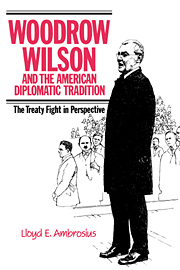Book contents
- Frontmatter
- Contents
- Preface
- Acknowledgments
- List of abbreviations
- 1 Introduction: Wilson's new world
- 2 Origins of Wilson's league of nations idea
- 3 Drafting of the League of Nations Covenant
- 4 American criticism of Wilson's peacemaking
- 5 Revision of the League of Nations Covenant
- 6 The question of control at home and abroad
- 7 The Versailles Treaty in the Senate
- 8 American rejection of the Versailles peace
- 9 The aftermath of Wilson's peacemaking
- 10 Epilogue: Wilson's legacy
- Bibliography
- Index
5 - Revision of the League of Nations Covenant
Published online by Cambridge University Press: 18 September 2009
- Frontmatter
- Contents
- Preface
- Acknowledgments
- List of abbreviations
- 1 Introduction: Wilson's new world
- 2 Origins of Wilson's league of nations idea
- 3 Drafting of the League of Nations Covenant
- 4 American criticism of Wilson's peacemaking
- 5 Revision of the League of Nations Covenant
- 6 The question of control at home and abroad
- 7 The Versailles Treaty in the Senate
- 8 American rejection of the Versailles peace
- 9 The aftermath of Wilson's peacemaking
- 10 Epilogue: Wilson's legacy
- Bibliography
- Index
Summary
Wilson returned to Paris in an uncompromising mood, convinced that a threatening combination of the League's American and European critics awaited him. He resented the French press's coverage of American opposition to the draft Covenant. Encouraged by Tumulty, he decided to thwart the ostensible prospect that the peace conference might conclude a preliminary settlement with Germany without the League. He issued a statement on March 15 reaffirming the earlier decision to establish a league as an integral part of the peace treaty. Neither the round robin nor a preliminary peace was acceptable to him. He wanted to make no concession to the League's opponents.
The Allies, however, often linked their support for the League to his acceptance of their conditions for peace. Wilson misunderstood the idea of a preliminary peace, which was a plan for expediting conference proceedings. It was not directed against the League. Still, he faced a challenge. Clemenceau wanted a more tangible guarantee of French security. He feared that the United States would revert to “traditional aloofness” and leave France vulnerable to a potentially resurgent Germany. In his opinion, the League, even when combined with German disarmament, would not afford adequate protection. Consequently, he sought to separate the Rhineland from Germany and to maintain Allied and American occupation of this territory. Because neither Wilson nor Lloyd George favored this policy, Clemenceau endeavored to win their approval without disrupting the victorious coalition, the maintenance of which he regarded as even more essential to France's security.
- Type
- Chapter
- Information
- Woodrow Wilson and the American Diplomatic TraditionThe Treaty Fight in Perspective, pp. 107 - 135Publisher: Cambridge University PressPrint publication year: 1987



